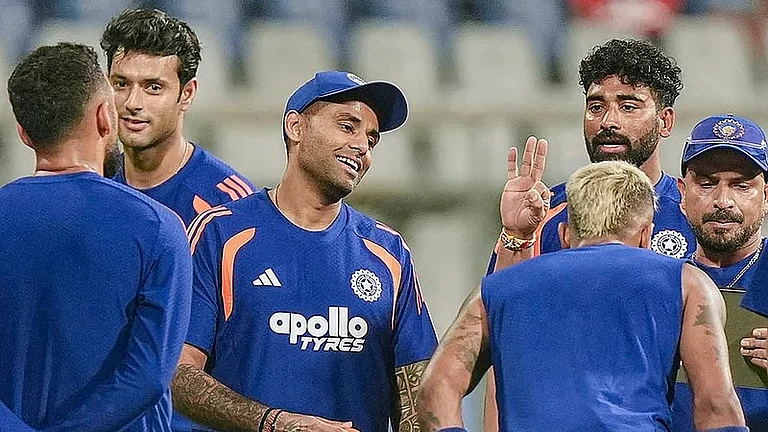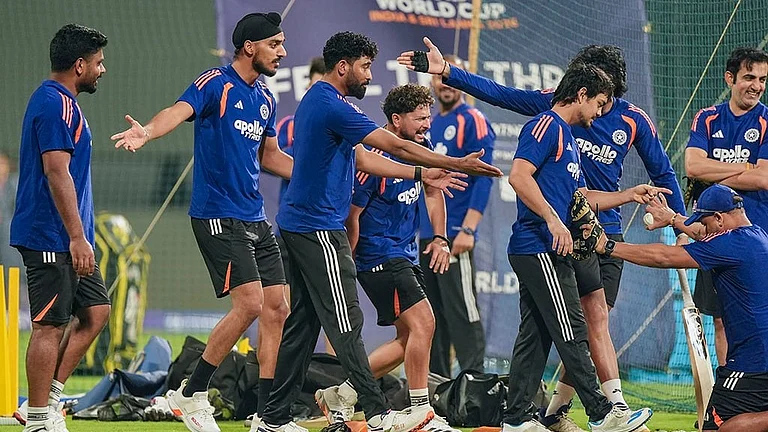September 17 last year was my sister’s birthday. I had ordered a cake, which was delivered in the morning. Greeting me with a smile while delivering my order punctually, the partner said: “Sir, please remember to rate me”.
In the evening, we ordered dinner using the same food delivery app. When the doorbell rang, to my amazement, I found the same delivery partner, still working 12 hours later, waiting at my doorstep, carrying parcels of biryani.
When I asked him about the inhumanely long work shift, he replied with a wry smile. I invited him in and offered a piece of cake, a request he did not refuse, but he rushed out soon and disappeared into the dark of the night. Later that night, I received a call from him. He wished my sister and apologised for rushing out earlier in the evening as he had other delivery commitments. Before hanging up, he did not forget to mention: “Sir, please remember to rate me”.
The new India is increasingly becoming more comfortable with digital technology. Indian consumers—especially those in the age group of 18-40— now represent a newly evolved class who effortlessly order their meals using apps. India is the largest market globally in this segment.
Reckoning this excellent opportunity, a plethora of organisations have mushroomed.
Food and grocery delivery apps run on a strict schedule and pledge to provide service to customers within unimaginable time constraints. Riders in orange, yellow and red polos, manoeuvring through the legendary Indian traffic on their two-wheelers, carry out such impossible oaths responsibly. All they request is high ratings for their humble service.
However, life is not easy for these delivery boys who have made our lives so easy.
On the very first day at work, it is made clear to them that they are not considered an integral part of the company. At most, they are categorised as freelancers or partners. Their wages are directly proportional to their performance—the number of deliveries they achieve in an hour, the distance they cover in minimal time and the amount of commodities they sell. As long as a delivery person is logged in on the system, there would be bread.
There is a reason these companies don’t hire employees on a permanent basis. It is easy to avoid questions regarding their rights and they are not obliged to give them insurance or provide them with other benefits. It’s a heavily misbalanced tilt in the favour of the companies.
‘Do you have a bike? Earn up to Rs 40,000 a month’–such lucrative phrases are used to lure delivery partners into chasing a dream, a new job, which perhaps could never be attained. In reality, this promised earning is a mirage. Even after driving over 200 km per day, this target remains untouchable. Delivery boys working for a leading food delivery app claim that to earn a minimal livelihood; they have to work a minimum of 12 hours daily.
One might need to be logged in even longer so that their locations are always visible to the authority who could send their way delivery requests in their vicinity. A delivery partner recollects how in September 2019, one of the leading food delivery apps had reduced incentives from Rs 40 to Rs 30 per delivery. As they were not permanent employees, the company could change their wage regulations at will. In such altered situations, delivery partners are bound to work an extra 3-4 hours to keep their income the same as earlier.
Time is literally money for these workers. One evening, I went out for a walk with my mother. I saw a delivery person wearing a red t-shirt trying his best to find an opening through the road divider. He was pushing it to somehow make room for his vehicle to pass. Somehow managing a narrow space between the rails, he quickly vanished. I realised, evidently, he cannot afford the subsequent loss of time if he were to follow traffic rules to take a U-turn from the next signal.
Often, these delivery partners end up breaking rules; they jump signals. At times, being misled on a wrong route by the GPS, they have to turn their bikes, consequently fined by the police. Most restaurants do not have any parking facilities for their vehicles. Traffic police rush at them seeing their bikes gathering near restaurants—some succeed to escape, others get penalised.
In 2013, a pizza company claimed to deliver pizza within 30 minutes. Failing to do so, it promised to refund the entire amount to customers. Gradually, many companies set foot in the market, each in competition with the other. Now, we have our groceries delivered within 10 minutes of placing our order. As a result, you and I are not exactly buying food. Companies are selling their commitment of convenience to us.
According to estimates, a delivery partner needs to be online for 11 hours a day and accomplish 13 food deliveries to confirm a daily pay of Rs 725; additional deliveries earn over another Rs 500. However, as per delivery boys, it is nothing but a stupefying daydream. The distance from one delivery spot to the other is such that no one can ever meet 13 delivery spots within 11 hours, as the fuel requirement for their vehicles is not affordable for them. This target is like a burning red furnace whose hunger is never satiated although the slaves are supplying coal incessantly.
Festivities come and go–the diary of these delivery boys do not change. Last year, just before Durga puja, the leading grocery delivery app reduced commissions from Rs 50 to Rs 20, per parcel. Workers realised they had to drive very fast to reach their destinations. As a result, monthly maintenance costs for their vehicles went up to Rs 3,500 on an average, which they had to bear themselves.
One of the workers associated with this app said he is finding it difficult to make ends meet under such circumstances. Another worker said: “Some of us toil for 16 hours a day. But, the commission for each order, when reduced to Rs 20 from Rs 50, amounting to a daily earning of Rs 300 seems impossible to sustain. Earning Rs 9,000 per month and deducting the vehicle maintenance of Rs 3500, we are left with only Rs 6,500. This does not even buy our daily bread, leave aside providing for the entire family.”
To fulfil this marketing commitment of faster delivery, the companies use skilled bikers as pawns. The whole system is based on keeping an eye over these pawns. The app is in constant watch over delivery partners—where they are, their exact time of entrance and exit at a delivery spot, and completion of each delivery—everything is under surveillance. There is no respite until the partners retire to bed for the day.
Long hours impact their health. The present setup tells us tales of new vigilant colonialism—centred around food and the ability to buy food. Delivery partners have to remain on constant wakefulness, to be forever online, under a system that is vigilantly keeping an eye over them.
In the last century, Michel Foucault introduced the concept of ‘Panopticon'. Foucault allegorically used Jeremy Bentham’s concept to compare the state system to a purgatory prison where the guard is watching over all from a central seat, himself remaining unseen to the prisoners. Foucault identified that this concept of Panopticon dominates our daily lives. It is not an organic state, but an allegory of strong vigilance.
Foucault cited the example where during the plague outbreak of 1700s in Europe, a micro-observance had begun where the state invigilated society through a magnifying glass. The patrollers used to walk by localities and the rule was for the home-confined residents to call out their names to proclaim their existence. Foucault called it Permanent Registration. Evidently, in such a system, nobody could exist with their own personal entities or identities, or even independence. A person is reduced to a ‘number in such a state system’. The food delivery system in today’s economy could also be considered such a ‘Panopticon’.
The delivery partners have no identity of their own; they are assigned a digital identity. Like in W.H Auden’s ‘The Unknown Citizen’, the partners are considered cogs in the machine, just numbers, whose solemn oath for livelihood is to stay awake, to be online. The companies do not take into account their personalities, their humane relationships and passions, or subdued wishes, need for a daily recess or regular rights to holidays.
In fact, the work-rules allow no consideration or compassion for them. A few months back, a Delhi-based resident Tariq Khan shared an incident on social media. He bumped into a food delivery partner in his elevator, who was bare foot. When Khan asked him the reason, he said he hurt his ankle in an accident and the swollen ankle did not allow him to wear his shoes. The company does not allow him any sick-leave, and he must earn, no matter what.
It is indeed a system of online slavery, where once online, the partners have no control or liberty over their basic rights. A definite task is given and the customer has to be reached within or before the given time. Such linear reduction enables dehumanisation to predominate at all times. What is to happen if they meet with an accident?
Thus, these delivery boys are fighting against three pillars of the society—customers, who want the delivery in accurate timeframes; the company, which has mandated the partners to race against time; and police, the keeper of the laws on the road.
A delivery partner has no access to a toilet. They are not allowed to use the toilet at a customer’s residence. They use a roadside toilet or vacant nooks and crannies of the concrete jungle. Pay-and-use toilets are a cheap option, but time spent attending to nature’s call is precious time wasted.
One rainy evening, I noticed around fifty food delivery partners gathered underneath an under-construction over bridge—huddled together, all drenched by the rain, squeezing their shirts and wearing them again to get ready for the next delivery. As the signal turned green, I went on my way, still thinking about those drenched men–they do not belong to any definite geographical area, they do not even know each other, just that their bodies were seeking momentary shelter with each other.
I intermittently present personal narratives to indicate how my sense and sensibility has recently been clouded by such variegated incidents on the news. The plethora of these images are but fragments of a collected whole. I have been pierced repeatedly by questions regarding this labour system, their daily health and hygiene.
One can conceive of this system in another way–the service providers actually use the body of the persons associated with this delivery system as a commodity. To enliven their digital identity, they borrow from their physical identity. When I recall that drenched evening, red and orange shirts soaked in rain, I understand that these people are a part of a larger digital prison, where the system plays and bets on their body functions.
In this context, I revisit the scenario of ‘Trans-Atlantic slavery’–world’s earliest form of slavery came into existence fuelled by the need for providing cheap labour.
The African labourers sailed to America by Portuguese ships around 1526. Gradually, countries like France and Britain imitated and adopted this system. These slaves collectively travelled over thousands of miles, urinating and vomiting on the ships together. Many died out of hunger, others were forced to sleep beside corpses, and their fettered living bodies waited a new, unforgiving dawn.
None of them found more room than that of a coffin. They were brought in shackles to build a new world economy. In present times, labourers working for food delivery companies are similarly chained by delivery apps. A delivery partner’s bliss, grief and desire revolve around the altar of the sacred ‘rating’.
In September 2020, in Navi Mumbai, a delivery partner got bit by a German Shepherd as he was stepping into the lift. The whole episode was later revealed by CCTV footage, his trousers drenched in blood. Do other professionals need to physically shed blood as part of their job descriptions?
These delivery partners need to carry loaded bags with them at all times. Often, delivery persons are prohibited to use lifts in residential buildings. Their shoulder nerves are damaged; spinal cords are worn and torn. Dr Pradip Choudhury, a physician at the sports injury centre, Safdarjung Hospital, Delhi proclaimed in an interview that he sees at least three patients daily, suffering from ailments of the spinal cord; astonishingly they are all delivery partners, who have no medical insurance for treatment and get no compensation.
Therefore, a vigilant system, always chasing their labour force, challenging their health and body, is, in turn, rendering them non-functional forever. It is nothing but a slave system!
These “slaves” are bound to accept what their masters bountifully give. A slave’s labour should be the cheapest. We have seen the ignominy of the subaltern: there is fear, fear of being cast out of the job. During the pandemic, many who lost their jobs were forced into this profession. Ordering food from home had become a regular necessity and there was a huge demand for cheap labour.
Gradually, as the situation is coming back to normal, food delivery organisations are trying to curtail expenses and earn more with the least possible expenditures. In many American cities, food delivery has already begun by the use of drones. In our country, a trial run of the delivery drone had been carried out in 2019. A drone could deliver around a load of 5 kilograms successfully at a distance of 10 kilometres. Around 20 more such organisations have been approved by the government.
The system first tried to make machines out of human beings, now they want to replace manual labour-force with powerful machinery. The delivery boys fear losing their jobs and they are even unable to protest against such atrocities, owing to this fear of sudden unemployment. Several delivery partners, who voiced their opinions, have been sacked. There is no way of redemption within this system. The new slave starts running again, who is destined to live as a slave under the present ‘power system’– a digital vigilance system.
Some delivery partners have confided to me that there are many more waiting in a queue to take their place for even less money. Thus, by default, just like in any slave system, the organisations’ main capital is this cheap labour, plentiful and readily available.
Political parties should collectively take responsibility to address this issue more seriously. Obliged are social workers to take initiative to build up consolidated public-awareness against this deadly system. We, who order food, must reflect further. Customers often ‘misbehave’ with delivery partners. If we stop, think and reflect on the agony of this slavery indirectly emerging from our own actions, we might gather more empathy in our beings to be friendly towards them.
Arka Deb is a Kolkata-based journalist and author. His interests include projects particularly about labour right, social media surveillance.


















